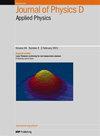Negative damping of terahertz plasmons in counter-streaming double-layer two-dimensional electron gases
IF 3.2
3区 物理与天体物理
Q2 PHYSICS, APPLIED
引用次数: 0
Abstract
The plasmon excitation in two-dimensional electron gases is a significant way of achieving micro-nanoscale terahertz (THz) devices. Here, we establish a kinetic simulation model to study the THz plasmons amplification in a semiconductor double-quantum-well system with counter-streaming electron drift velocities. By comparing the simulation results with theoretical dispersion relations, we confirm two competing mechanisms of negative damping suitable for THz amplification: Cherenkov-type two-stream instability and a new non-Cherenkov mechanism called kinetic relaxation instability. The former is caused by the interlayer coupling of two slow plasmon modes and only exists when the drift velocities are much greater than the fermi velocities. The latter is a statistical effect caused by the momentum relaxation of electron-impurity scattering and predominates at lower drift velocities. We show that an approximate kinetic dispersion relation can accurately predict the wave growth rates of the two mechanisms. The results also indicate that the saturated plasmonic waves undergo strong nonlinearities such as wave distortion, frequency downshift, wave-packet formation, and spectrum broadening. The nonlinear evolution can be interpreted as the merging of bubble structures in the electron phase-space distribution. The present results not only reveal the potential mechanisms of the plasmonic instabilities in double-layer 2DEGs, but also provide a new guideline for the design of on-chip THz amplifiers.逆流双层二维电子气中太赫兹质子的负阻尼
二维电子气体中的等离子体激发是实现微纳尺度太赫兹(THz)器件的重要途径。在这里,我们建立了一个动力学仿真模型来研究具有逆流电子漂移速度的半导体双量子阱系统中的太赫兹质子放大。通过将模拟结果与理论频散关系进行比较,我们证实了两种适合太赫兹放大的负阻尼竞争机制:切伦科夫型双流不稳定性和一种新的非切伦科夫机制--动能弛豫不稳定性。前者是由两个慢速等离子体模式的层间耦合引起的,只有当漂移速度远大于费米速度时才会存在。后者是由电子-杂质散射的动量弛豫引起的统计效应,在漂移速度较低时占主导地位。我们的研究表明,近似动力学色散关系可以准确预测这两种机制的波增长率。结果还表明,饱和质子波会发生强烈的非线性现象,如波畸变、频率下移、波包形成和频谱拓宽。非线性演化可解释为电子相空间分布中气泡结构的合并。本研究结果不仅揭示了双层 2DEG 中等离子体不稳定性的潜在机制,还为片上太赫兹放大器的设计提供了新的指导。
本文章由计算机程序翻译,如有差异,请以英文原文为准。
求助全文
约1分钟内获得全文
求助全文
来源期刊
CiteScore
6.80
自引率
8.80%
发文量
835
审稿时长
2.1 months
期刊介绍:
This journal is concerned with all aspects of applied physics research, from biophysics, magnetism, plasmas and semiconductors to the structure and properties of matter.

 求助内容:
求助内容: 应助结果提醒方式:
应助结果提醒方式:


